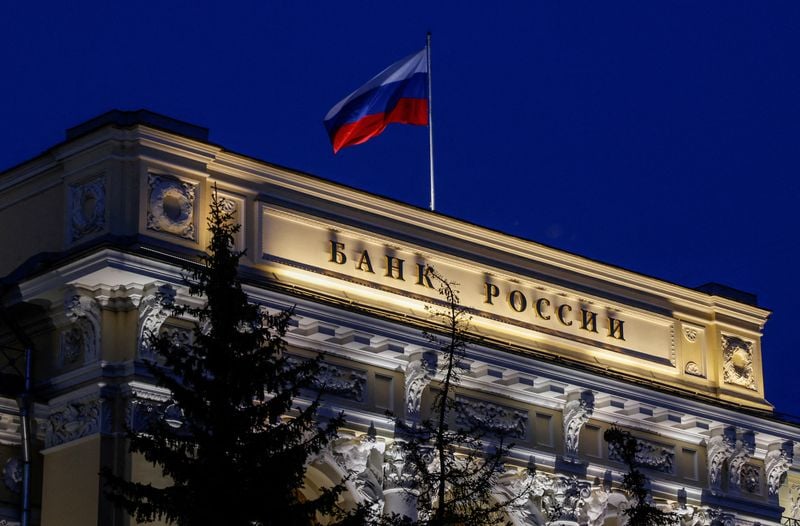(Reuters) -Russia’s central bank said on Tuesday that the role of the dollar and the euro as global currencies would decline as central banks rethink their strategies after the West froze Russian reserves, suggesting it could consider imposing negative rates for dollar and euro deposits.
Unprecedented Western sanctions have frozen around half of Russia’s gold and foreign exchange reserves, which stood near $640 billion before Moscow started its military campaign in Ukraine on Feb. 24.
The Bank of Russia said this precedent along with discussions about a possible seizure of the frozen part of reserves would prompt other central banks, primarily in Asia and the Middle East, to rethink strategies for their savings.
“One could expect an increase in demand for gold and a decline in the U.S. dollar’s and the euro’s role as reserve assets,” the bank said in a report on financial stability.
As of late 2021, the Russian central bank held $131.5 billion of its reserves in gold, while the remainder of the $612.9 billion reserves was held in foreign currency assets. As of May 20, Russia’s reserves slipped to $583.4 billion.
The central bank said the share of foreign currency liabilities Russian banks had has declined recently as clients stepped up withdrawal of funds from their currency accounts, while the share of banks’ foreign currency assets has increased.
“One of the results of the imposed sanctions restrictions for the foreign exchange market was the tendency to increase the use of currencies alternative to the U.S. dollar and the euro,” the central bank said, referring to the Chinese yuan in particular.
To speed up the process, Russia could consider imposing negative interest rates on deposits held in dollar and euros, the central bank said.
Central Bank Deputy Governor Ksenia Yudaeva clarified later such discussions only concerned corporate clients’ foreign exchange deposits with banks, not those of retail clients.
Yudaeva said it was too early to lift the $10,000 limit on Russian citizens’ withdrawals from their currency accounts, in place since the early days of the campaign in Ukraine, but did not rule out its review in Sepember.
“We’ll wait for September and we’ll see then,” Yudaeva told reporters.
In late 2021, the share of foreign currencies in household assets, including stocks and deposits, has been around 22%, and the central bank at the time said it had no plans to lower it.
The central bank also said in the report that Russian private investors have become the stock market’s main driving force amid trading restrictions for non-residents.
($1 = 61.1000 roubles)
(Reporting by ReutersEditing by Chizu Nomiyama and Tomasz Janowski)
